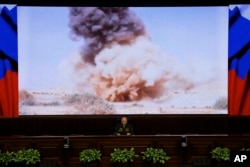Israeli Prime Minister Benjamin Netanyahu's second meeting in Moscow with Russian President Vladimir Putin in less than two months Tuesday underscores increasingly closer relations between the U.S. ally and Russia as Moscow's influence grows in the Middle East.
Russia's military campaign in support of Syrian President Bashar al-Assad is showing no sign of ending, despite the Kremlin's March announcement of a partial withdrawal of forces. Moscow is stepping up relations with Iran as well, including military sales, following the nuclear deal to lift sanctions.
Israel's security concerns
But while most Western governments question Russia's intentions, Tel Aviv is more concerned about fighters from Iran and Lebanese Hezbollah, who also are supporting Assad in Syria.
Netanyahu wants Putin's security assurances that these groups, which vow Israel's destruction, will not acquire advanced Russian weapons being used in the Syria conflict via Moscow's ally in Damascus.
"Netanyahu can't but understand that even if Russia gives guarantees not to supply weapons to Hezbollah, it is not in a position to control the relevant links between Tehran and Damascus, whose special services have supplied, supply and will continue to supply the Party of Allah' with all that's necessary," said Sergey Balmasov of the Institute of the Middle East and the Russian International Affairs Council in emailed replies to VOA.
Both Russia and Israel have expressed satisfaction with a security agreement made on Netanyahu's last trip to Moscow.
"As the situation since the end of September 2015 shows, Moscow and Tel Aviv interact quite productively — Israel turned a blind eye to the repeated violations of its air space by Russian combat aircraft, while the Russians wouldn't see the Israeli air force hit the Iranians and Hezbollah," said Balmasov. "It is a kind of semi-official military technical cooperation."
Relations improving
Netanyahu's Moscow visit, his third in the past year, comes on the 25th anniversary of Israel-Russia relations and will be showcased by Russian authorities as another example of the West's failed isolation campaign.
Despite Russia's support for Damascus, and close ties with Iran, the Russia-Israeli relationship has been growing closer, even while tensions simmer between Moscow and the West.
"Israel's persistent consultations with Putin are just a reflection of the serious and gradually increasing cracks in the relationship between Israel and the United States," argued Balmasov.
Israel irked Washington and Brussels by staying neutral on Western sanctions against Russia over its annexation of Crimea and support for separatists in east Ukraine.
"Israel has some territories which U.S.A. does not consider Israeli territories which is very common to what is going on now with Russia," said senior researcher at the Oriental Studies Institute of the Russian Academy of Sciences Dmitry Maryasis."It makes, maybe politically, the two countries closer to each other."
Israel in May appointed its first Russian speaking defense minister, Soviet-born Avigdor Lieberman, a right-wing politician who is considered close to Putin.
"Of course, the nomination of Avigdor Lieberman, who has long contacts with Moscow, including the time when he was a foreign minister, is a serious sign in relations between Israel and Russia," said Balmasov.
Limits of partnership
Despite Israel's neutrality on sanctions, trade with Russia shrank 32 percent in 2015, and the number of Russian tourists visiting Israel fell sharply, according to Russia's TASS news agency, a trend that both sides want reversed.
"In view of the quarrel between Russia and the West over Ukraine and Turkey and Syria, expressed in the sanctions war, Netanyahu intends to fill the niche left in the Russian market by the Turkish and European producers, especially agricultural," said Balmasov.
And although security cooperation between Russia and Israel is pragmatic and growing, analysts say it is not likely to reach the alliance level that Tel Aviv has with Washington anytime soon.
"Israel, of course, keeps in mind that Russia has close relations with Iran," said Maryasis. "And, Israel is not ready to cooperate in military with the country. If we speak for example about R&D and future technologies and so on — that the results of this R&D could be somehow found in Hezbollah camps or in Iran army camps."
And, like much of the world, Israel still has concerns and unanswered questions about Russia’s plans in Syria, said Balmasov.
“Accordingly, the Israelis need more certainty and understanding what the Russians really want in Syria: just to assert itself after the collapse of the USSR, to amuse [the] vanity of its leaders, or stay there for a long time?” he asked. “And if so, what is Israel to expect from its actions?”





